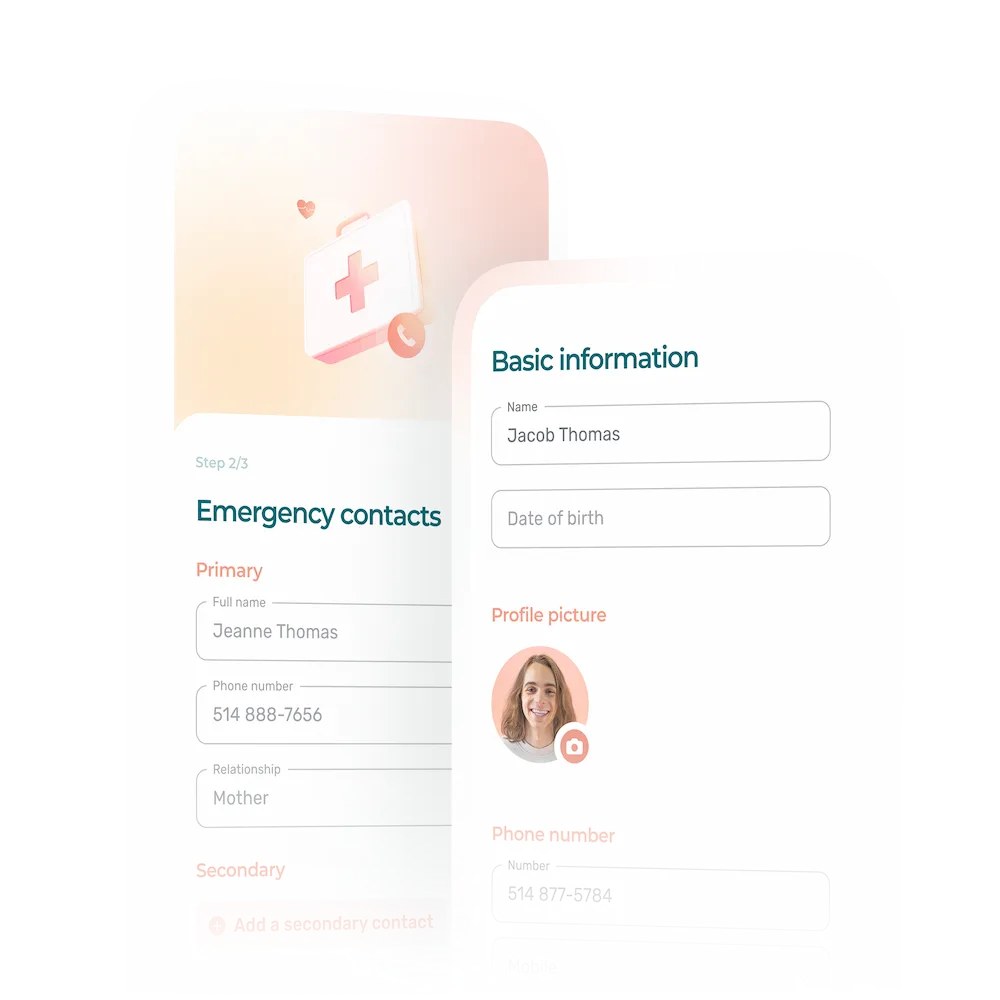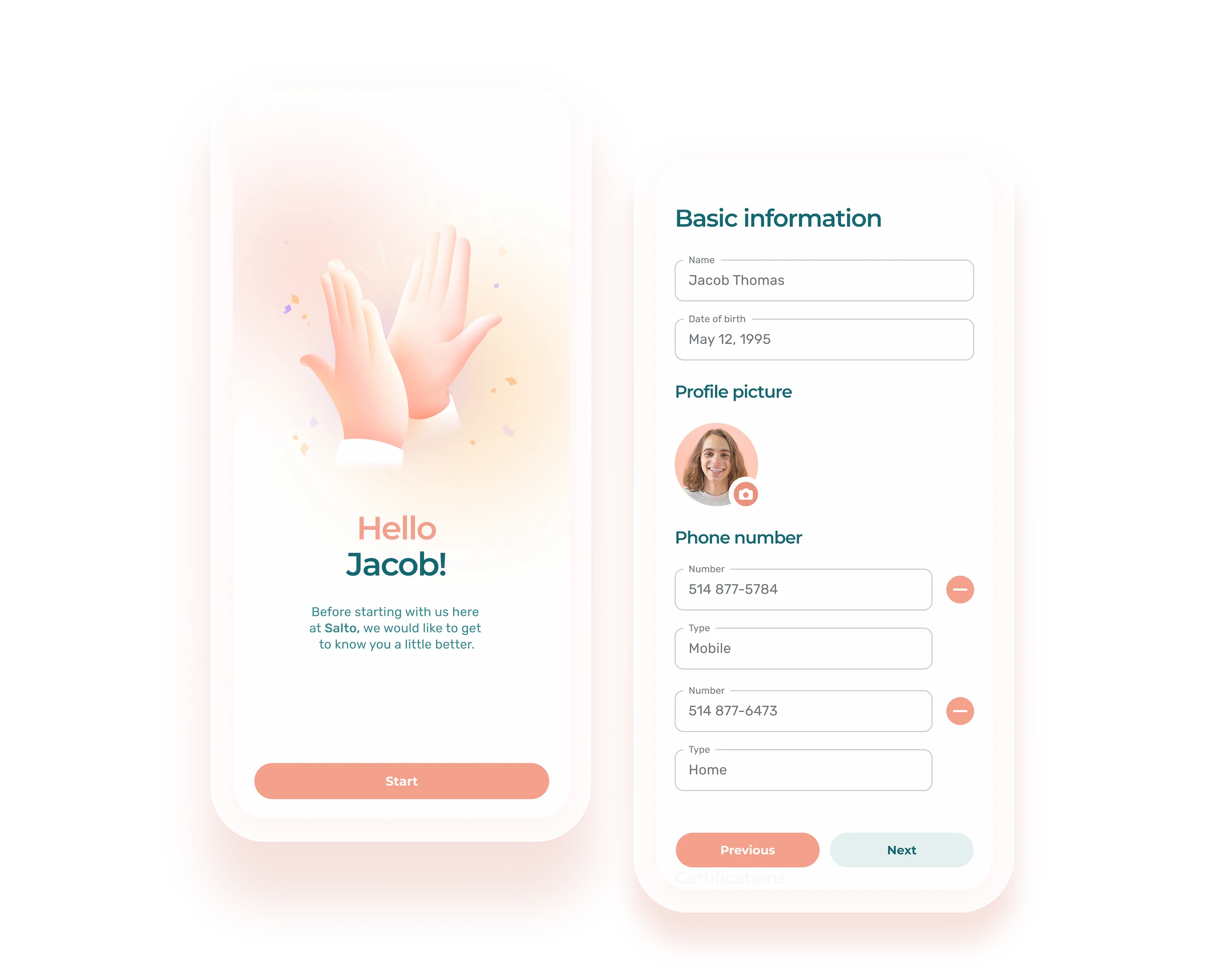Recruitment tests are an effective way to check a candidate’s skills or better understand their aptitudes and behaviors.
Recruitment tests are very useful and widely used in human resources. But what is their actual purpose?
- To gather additional information about a candidate;
- To facilitate the recruitment process; and
- To choose objectively between different candidates.
In this post, you’ll learn how to choose your recruitment test based on your goals and needs.
Which Recruitment Test Should You Choose?
1. Personality Tests
Personality tests assess candidates’ soft skills, behaviors and attitudes. When used effectively, they can assess whether an employee will thrive in a work environment and get along with the rest of the team.
To know if the prospective employee will be a good fit with the rest of the team, you need to know the results of the employees already in place. Keep in mind that a smooth-running team is often made up of people with a variety of profiles.
Example of a test
The MBTI test and the OCEAN 5 are probably some of the most widely used tests. They are freely available online and easy to complete.
2. Workplace Scenarios
Workplace scenarios let you evaluate how a candidate reacts in various situations. Because they are quick and easy to complete, they are ideal for effectively evaluating a candidate.
Examples of Situations
For a waitress:
- After finishing his plate, a customer tells you that his meal wasn’t to his liking. What do you do?
For a customer service clerk:
- A customer walks into the store just as the phone rings and another customer approaches you with a question. In what order would you assist each person?
3. Skill Tests
Skill tests are used to check whether a candidate has the technical proficiency required for a position, in terms of writing skills, technical know-how, or their command of a second language, for example.
These tests are the most widely used in the workplace. They lend themselves well to any position requiring specific skills.
However, if not used properly, they can be completely useless. I once had a coworker who didn’t really have the right skills for the job. He had taken a test during his interview—but it became apparent that the test had poorly reflected his daily tasks.
This mistake had a direct impact on the rest of the team, which had to work hard to compensate for the coworker’s lack of competence… and his eventual departure.
Examples of Tests
Language proficiency tests are often used to measure the quality of candidates’ written English. For example, the candidate may be asked to revise a text or write a short paragraph on a given topic.
To be effective, skill tests must directly relate to the tasks of the position at hand.
4. Reasoning Tests
Reasoning tests appraise candidates’ logical, verbal and numerical skills. They are often used for positions that require decision-making in complex situations.
Government institutions use them to recruit candidates for public service.
Examples of Tests
The applicant is asked to complete series of words, numbers, symbols, etc.
- 1, 2, 6, 42, […]. Answer: 1,806, i.e., 1 × (1+1) = 2; 2 × (2+1)= 6; 6 × (6+1)= 42; 42 × (42+1)= 1,806.
- Attractive, ugly, intelligent, stupid, rich, […]. Answer: poor, i.e., the opposite of the word.
5. Cognitive Tests
Cognitive tests measure a candidate’s attention and memory.
These tests are often used for highly specialized positions with great responsibilities. They are an indicator of a person’s potential.
Examples of Tests
A memory test measures a candidate’s ability to remember information. For example, they may be asked to memorize a data grid for 5 minutes and then reproduce it from memory on a blank sheet of paper.
IQ tests are also sometimes used, but are criticized by many recruiters.
6. Behavioral Assessment
Behavioral assessments determine a candidate’s ability to respond to a workplace situation. They are used to validate behavioral competencies such as a candidate’s personal attributes, analytical ability, interpersonal skills or leadership.
These tests can be adapted to any industry, and can be used to validate whether a candidate has the behavioral characteristics required for the position to be filled.
Examples of Tests
The candidate is asked to explain how they have handled or would have handled a certain type of situation at work, for example:
- A customer lets you know that their dish is not to their liking. How do you handle the situation?
- A customer calls to cancel their contract. What do you do?
- A colleague keeps interrupting you during a meeting. What do you do about it?
- Your immediate superior gives you constructive feedback to improve your communication skills. How does the meeting go?
7. Numerical Aptitude
Numerical aptitude tests assess whether a candidate can quickly analyze any data and draw relevant conclusions.They therefore validate that candidates are able to quickly and easily understand tables or graphs, for example. Numerical aptitude tests are sometimes also referred to as data analysis tests.
These tests identify a candidate’s potential strengths and weaknesses. They enable the recruiter to measure their skill levels and plan further training, if necessary.
Examples of Tests
A multiple-choice test where the candidate must analyze data and determine the best conclusion to draw from it.
8. Background Checks
Background checks allow employers to validate certain information about a candidate. These pre-employment tests are typically used by human resources departments before sending a formal job offer to candidates.
They enable organizations to reduce the risks associated with hiring a new employee. They can focus on a candidate’s criminal background, previous work experience or even the veracity of certain information such as a college degree.
Examples of Tests
The most common background tests include:
- Professional background check
- Criminal background check
- Reference check
- Educational background check
- Credit score check
- Social media background check
9. Language Proficiency Tests
Language proficiency tests measure a candidate’s ability to communicate in a given language.These tests are particularly useful for positions requiring bilingualism.
The skills assessed may relate to grammar, oral or written communication, for example.
Examples of Tests
Recruiters may conduct part of an interview in another language to measure a candidate’s ability to express themselves in that language. They may also ask candidates to take a written test to assess their skill level.
10. Performance Tests
Performance tests provide a concrete measure of an employee’s skills by asking them to perform a specific task.
They should be systematically used in the recruitment process for positions requiring specialized skills, such as programmers or IT specialists.
Examples of Tests
A recruiter asks a programmer to code a feature in a given language to assess their ability to use that language with ease.
A recruiter asks an accounting technician to demonstrate their ability to use software by asking them to perform complex tasks.
11. Physical Ability Tests
Physical ability tests measure a candidate’s physical aptitudes, such as strength, endurance or cardiovascular capacity.
These tests are only available for jobs requiring specific physical skills. Recruiters who use this type of test must ensure that they comply with the laws in force to avoid discrimination in their recruitment process.
Examples of Tests
Physical tests required to become a police officer, firefighter or a member of the army are the most common examples.
12. Substance Abuse Tests
Prohibited substance tests assess whether or not a candidate uses certain substances, using medical analysis. The substances most often tested are drugs and alcohol.
Some workplaces prohibit the use of certain drugs or alcohol. Employers may therefore ask candidates to undergo medical tests to validate certain information.
Examples of Tests
The most common tests are blood or urine tests.
Benefits of Using Pre-employment Tests
Using recruitment tests is a widespread corporate practice. Most human resources departments use pre-employment tests in their recruitment process to make informed decisions.
Here are 4 benefits of using recruitment tests in your organization.
1. Eliminating Bias
A recruitment test can measure a candidate’s skills, behaviors or aptitudes, eliminating recruiter bias.
Professional recruitment tests enable conclusions to be drawn based on neutral data. By subjecting all candidates to the same standardized tests, recruiters can make decisions based on their results, rather than simply relying on their feelings.
Pre-hiring tests also reduce the risk of discrimination.
2. Improving Recruitment Practices
Although recruitment tests are not infallible, they can often help to avoid hiring the wrong candidate. Since tests tangibly assess the quality of knowledge, skills or behaviors, the risk of choosing the wrong person for a job is reduced.
Tests force recruiters to clearly define their needs and objectives before proceeding with job interviews. They also provide better feedback to candidates who don’t get the job.
3. Easing Candidate Onboarding
Onboarding a candidate who has passed one or more recruitment tests is typically easier. The candidate’s profile corresponds exactly to what they need to integrate easily into the team and become autonomous in their tasks.
Personality tests are particularly useful for adapting onboarding to the individual’s needs. Candidates benefit from a better employee experience.
4. Increase Employee Retention Rates
Since recruitment tests help validate the match between a candidate’s profile and the position to be filled, they can help increase employee retention rates.
They also enable recruiters to quickly identify the most motivated candidates, since they generally require a little more work than a simple job interview.
How Do You Know if Your Test Is Appropriate?
A recruitment test must be fair, measurable, simple and effective.
To this end, all candidates must be afforded the same test conditions, including length, instructions, materials, etc. The questions must be clear, and the answers must be able to be analyzed based on an objective evaluation grid.
Most importantly, the test should not be overly complex or time-consuming for the candidates.
I myself have had first-hand experience with an overly demanding skill test. During the interview, I was told that I would have to complete a short test at home and I was assured that it was straightforward. But it turned out to be exactly the opposite; the test was so long and complicated that it left me completely demotivated. I finished it anyway, without much enthusiasm.
I was ultimately told that I lacked experience for the position even though my skill test score was up to their expectations.
Let me tell you, I felt like it was a complete waste of my time. To this day, I still have an unpleasant memory of that hiring process.
In today’s labor shortage context, all employers should make the recruitment process simple and pleasant. After all, the interview is also an opportunity for you to charm the candidate.
Where to Start?
Recruitment tests are wonderful tools for rounding out an evaluation of different candidates. However, they should not be used as the sole criterion for selection.
There are plenty of other tips to make sure you select the right candidate, starting with making sure you have an effective, rigorous and fair recruitment process.
What Are Recruitment Tests?
A recruitment test refers to the evaluation of a candidate’s skills, aptitudes and behaviors as part of a hiring process.
Recruitment tests can take many forms, such as a personality test or a cognitive aptitude test. They are also referred to as pre-employment tests.
Why Do Employers Use Recruitment Tests?
Employers use recruitment tests to ensure they hire the best candidates for the job. Pre-employment tests enable them to validate there is a match between a candidate’s profile and skills and the position they are recruiting for.
Using such tests reduces hiring errors, improves the company’s recruitment process, smoothes out candidate onboarding and lowers the employee turnover rate.
What Types of Recruitment Tests Are There?
The different types of recruitment tests include:
- Personality tests
- Cognitive aptitude tests
- Specialized skills tests
- Performance tests
- Physical ability tests
- Background checks
- Psychotechnical tests
- Work scenarios
- Reasoning tests
- Behavioral assessments
- Data analysis tests
- Language aptitude tests
Are Recruitment Tests Mandatory?
Recruitment tests are not generally compulsory under employment law. However, some companies may decide that certain tests are mandatory within their organization, such as a physical test or a background check.
However, recruitment tests must be relevant to the positions in question, otherwise the company could face charges of discrimination.
Candidates can therefore refuse to take a recruitment test, although this decision may have unfavorable consequences for their application.











